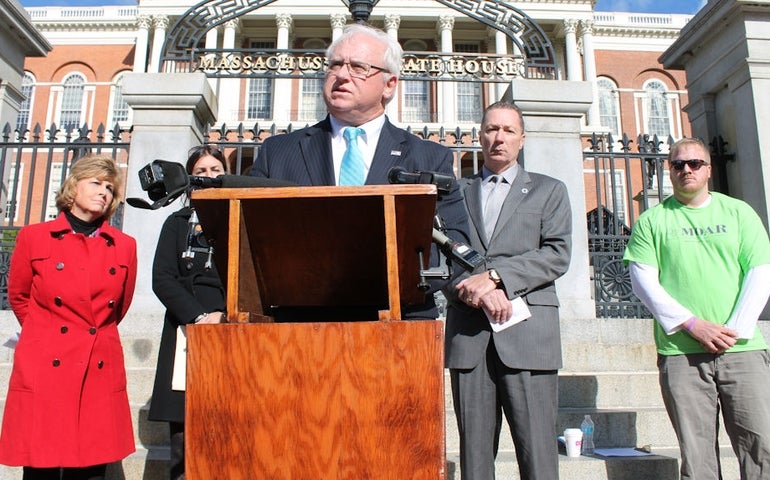Legalization of marijuana would result in greater dangers on Massachusetts roadways, where authorities are ill-equipped to even know whether drivers are intoxicated by the leafy green drug, opponents of Question 4 said Tuesday.
“If this ballot question passes we’re asking police officers on the street to do an impossible task. We’re asking them to determine if somebody’s impaired or not,” Rep. Paul Tucker, the former chief of police in Salem, said at a press conference outside the State House.
Unlike drunk driving tests where blood and breath measurements can give a clear indication of a motorist’s state of intoxication, marijuana drug tests generally measure whether someone has used the substance over a longer period of time.
Jim Borghesani, the spokesman for the campaign seeking to legalize adult marijuana usage through the ballot initiative, said studies are underway that could potentially improve enforcement, and said police can now take action when someone is driving erratically.
“Police officers have every ability to pull over somebody who’s driving impaired and take them off the road,” Borghesani told reporters. There will be two studies in the field next year with researchers exploring the use of “intelligent fingerprinting” and saliva to determine recent marijuana usage, he said.
Polls have shown voters leaning toward passage of Question 4, which would legalize adult possession, home-use and eventually the retail purchase of marijuana. Opponents say easier access to the drug – especially in its slow-acting edible form – could create a menace on streets and highways.
Mary Maguire, the director of public and legislative affairs for the American Automobile Association in Massachusetts, said marijuana consumption hampers drivers’ ability to judge distance, reduces peripheral vision and coordination, and makes it more challenging to stay in a driving lane.
“Driving is the most dangerous thing that we all do, most of us, every single day. Let’s not make it even more dangerous to get behind the wheel here in Massachusetts,” said Maguire, who said marijuana also impairs drivers’ judgement and reaction times.
Mark Leahy, the former chief of the Northborough police who is now executive director of the Massachusetts Chiefs of Police Association, told the News Service that police can receive training to become drug recognition experts – or D.R.E.s – but it is expensive.
Leahy said officers can make a stoned driving arrest even without D.R.E. training but said there is a “horrific conviction rate” even for drunk driving, a crime where there is widespread public knowledge and tests that can quantify the amount of alcohol in someone’s bloodstream.
Sam Cole, a spokesman for the Colorado Department of Transportation, told the News Service the state has upwards of 250 drug recognition experts but no roadside device to measure the level of marijuana in a person’s system.
In Colorado, where retail marijuana sales began in 2014, drivers suspected of marijuana intoxication are asked to consent to a blood test after they are arrested, with penalties for refusal, Cole said, and the state’s legislature set a limit of 5 nanograms of THC – an intoxicating chemical in marijuana – per milliliter. He said there is disagreement about whether that is an accurate measure.
Essex County District Attorney Jonathan Blodgett said the state is “years away” from a roadside test for marijuana intoxication that is approved by the courts.
Borghesani said Massachusetts lawmakers should have set standards to convict someone for driving while high on marijuana after voters decriminalized possession of up to an ounce of marijuana in 2008 or after voters legalized marijuana for medical purposes in 2012.
“What we do need is the ability to prove in court that somebody is impaired on marijuana. We think the Legislature should have done that after decriminalization passed in 2008 when it was the Legislature and the [district attorneys] and the sheriffs who said, ‘We can’t control the roads,'” Borghesani said. “Two thousand and twelve they all said the same thing: ‘It’s going to be carnage on the streets. We can’t prove marijuana intoxication.’ It passed. They did nothing.”
Earlier this year Rep. Shawn Dooley, a Norfolk Republican, proposed outlawing smoking marijuana while driving – something that is not in of itself illegal in the state – but his proposal did not make it into law.
Even without full legalization, marijuana is commonly and often openly used around Massachusetts. Mothers against Drunk Driving, MADD, opposes all impaired driving but does not take a position on the legalization of recreational marijuana, according to a spokesperson.
“Drugged driving, like drunk driving, is 100 percent preventable,” Becky Iannotta, a communications manager at the anti-drunk-driving group, said.
Reisa Clardy, the widow of Trooper Thomas Clardy who was killed in a car crash by an allegedly marijuana-intoxicated driver, said the proposal would lead to “more fatalities” in a video released by opponents of Question 4 on Monday. Borghesani said in a statement if the allegedly stoned driver is convicted, he should be “punished to the fullest extent of the law.”
Citing a AAA study, Maguire said fatal crashes involving drivers who have recently used marijuana “nearly doubled” in Washington state – which legalized marijuana around the same time as Colorado. Borghesani pointed to the study’s own acknowledgment that “the data available cannot be used to assess whether a given driver was actually impaired.”
Cole said the percentage of the Colorado state patrol’s intoxicated driving stops for marijuana ticked up from 12 percent of driving under the influence incidents in 2013 – before full legalization – to 18 percent in 2015. During the same time period, officers have become better trained to detect marijuana intoxication, he said.
“The data is very murky,” Cole said, recommending states set a legal limit, train officers, gather data, and launch a public safety awareness campaign.

